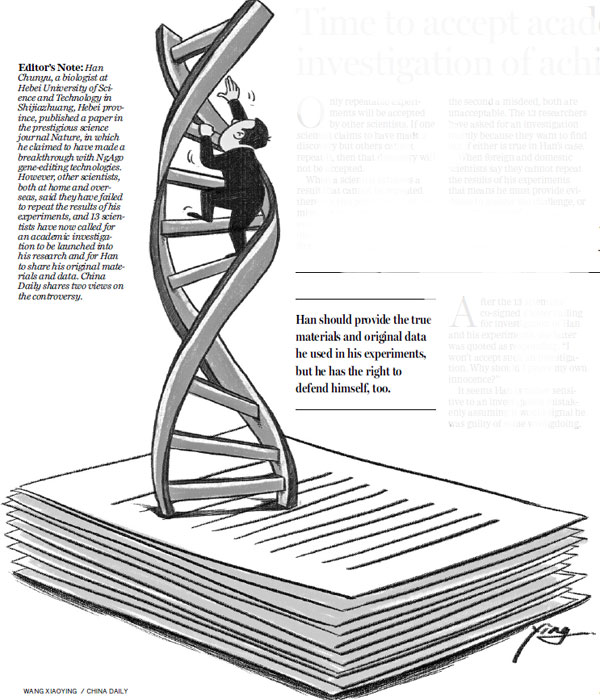Time to accept academic investigation of achievement
Updated: 2016-10-20 08:27
(China Daily USA)
|
|||||||||
Editor's Note: Han Chunyu, a biologist at Hebei University of Science and Technology in Shijiazhuang, Hebei province, published a paper in the prestigious science journal Nature, in which he claimed to have made a breakthrough with NgAgo geneediting technologies. However, other scientists, both at home and overseas, said they have failed to repeat the results of his experiments, and 13 scientists have now called for an academic investigation to be launched into his research and for Han to share his original materials and data. China Daily shares two views on the controversy.
Only repeatable experiments will be accepted by other scientists. If one scientist claims to have made a discovery but others cannot repeat it, then that discovery will not be accepted.
When a scientist achieves a result that cannot be repeated, there are two possibilities, either mistakes were made in the experiment or the data has been intentionally falsified. In the first instance it's an error and in the second a misdeed, both are unacceptable. The 13 researchers have asked for an investigation mainly because they want to find out if either is true in Han's case.
When foreign and domestic scientists say they cannot repeat the results of his experiments that means he must provide evidence to answer the challenge, or his "achievement" won't be recognized.
Of course, such an investigation should be fair and follow strict procedures. In the United States, Denmark and Finland, it is a government department that does the job, while in Germany, Japan and France, it is renowned foundations that investigate.
Han should provide the true materials and original data he used in his experiments, but he has the right to defend himself, too.
Zhang Tiankan, vice-chief editor of Encyclopedia magazine and a former medical researcher
After the 13 scientists co-signed a letter calling for investigation of Han and his experiments, the latter was quoted as responding: "I won't accept such an investigation. Why should I prove my own innocence?"
It seems Han is rather sensitive to an investigation mistakenly assuming it would signal he was guilty of some wrongdoing.
But even if an investigation concludes that Han's achievement does not stand that does not necessarily mean there has been any malpractice by Han. He might have made an unintentional mistake in his experiments, or achieved an accidental result somehow.
If Han has carefully read the reports of the 13 scientists who call for the investigation, he should know that they do not include any prejudice against him and no one suspects him of intentionally falsifying data. People are just anxious to know whether his experiment is repeatable or not.
Especially, most of the scientists trying to repeat Han's experiment are using public money to do so. Their attempts at emulating the results of his experiments have already consumed lots of money.
We hope Han will accept the investigation as the opportunity to show he has nothing to hide. If he tries to resist the investigation, then that will lead to doubts about his trustworthiness.
Zhang Zhouxiang, a writer with China Daily

(China Daily USA 10/20/2016 page12)
Today's Top News
Lawmakers stage walkout to protest anti-China acts
Syrian army declares 3-day truce in Aleppo
BBC report on Terracotta Warriors refuted
Iraqi forces recapture more villages around Mosul
Greeks rally against labor reforms
Iraqi forces fighting all out to free Mosul from IS
Chinese pupils flock to UK independent schools
Britain's May, faced with turmoil, agrees to a debate
Hot Topics
Lunar probe , China growth forecasts, Emission rules get tougher, China seen through 'colored lens', International board,
Editor's Picks

|

|

|

|

|

|







